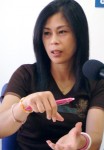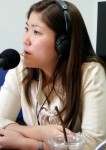We had 3 topics tonight!
1. Are there too many rules in Japan?
2. What were you doing at the moment of 9.11?
3. Differences between Hurricane, Cyclone and Typhoon.
今夜、My Eyes Tokyoは主に3つのトピックについてお伝えしました。
1.日本は規則が多すぎる?
2.9.11の瞬間、あなたはどこにいましたか – 私たち3人の場合 –
3.ハリケーン/サイクロン/台風の違い
<Are there too many rules in Japan? 日本は規則が多すぎる?>
We introduced 2 opinions. First of all, a comment from an American man;
“I think every society has its rules. Japan has certain rules that are not found in Western countries such as bowing when greeting someone, using polite languages (keigo) toward superiors and taking off shoes before entering a room. There are rules which can fill up a whole book for using chopsticks. Unlike in other Asian countries, it is considered proper to slurp ramen noodles while eating them. In the former, no noise is permitted.”
アメリカ人男性:
「どの社会にもルールというものは存在します。上司へのお辞儀、敬語、部屋に入る前に靴を脱ぐことなど、欧米にはないルールが日本に多々あります。箸に関しては一冊になるぐらいです。でも他のアジアの国と違い、日本ではラーメン、うどん、蕎麦などを食べる時に音を立ててすするのが一般的だが、向こうではそういった習慣がタブーになっています」
Another comment from a Swiss woman;
“In daily live, I don’t think so. In a business environment, the hierarchy with senpai/kohai can be tireing, but at the same time I don’t mind the use of Keigo as it is a part of culture. What I see as most disadvantages are the rules and regulations that exist to bring into Japan new technology, pharmaceutical products or medical devices. In order to protect local industry, the general public is willing to accept outdated medical or pharmaceutical practices. Just check the drug, vaccine or instruments related to checking the wellbeing at hospitals.”
スイス人女性:
「日常では、規則が多いとは思いません。ビジネスシーンでは、先輩・後輩の上下関係にウンザリなんてこともあり得ますが、敬語を使うことには抵抗はありません。それも日本の文化だからです。
規則や規制が働いていることを感じるのは、日本が外から新しい技術や医薬品、医療機器などを輸入する時です。国内産業を守るために、時代遅れの薬品を使っているように思います。薬品やワクチン、病院での健康診断などに用いる機器を今一度確かめてみてください」
What do you think? Your comments are very, very welcome. We’ll continue to talk on this topic next week.
みなさんはどう思われますか?来週もこのテーマでトークしていきますので、まだまだコメントをお待ちしております!
<What were you doing at the moment of 9.11? 2001年9月11日、あなたはどこで何をしていましたか?>
3 of us told you about our 9.11 episodes after we played the song called “Wake Me Up When September Ends” by Green Day. Tokuhashi have already told what he was doing in the morning on September 11, 2001 before. Look at http://fm840.jp/blog/myeyestokyo/?p=1016. What did you do at the moment of 9.11? Where were you then?
Green Day「Wake Me Up When September Ends」の後に、私たち3人の911エピソードをお伝えしました。まずマヤですが、その瞬間はフィリピンの日系企業にてミーティング中で、お父様より電話で第一報をうけました。ご友人が世界貿易センタービルの近くにお住まいだったそうですが、幸いご無事でした。
アイリーンは当時日本にいました。ご友人から「小型飛行機がビルに衝突したって!」と言われました。当初テレビでは、セスナがビルに突っ込んだという情報が流れたそうです。
そして徳橋ですが、実は去年の9月11日の放送でお伝えしました。当時の私のブログをご覧くださませ。http://fm840.jp/blog/myeyestokyo/?p=1016
… And we should not forget that tomorrow is a 6-month anniversary of the Great East Japan Earthquake.
でも、もうひとつ忘れてはならないこと… 明日は東日本大震災からちょうど半年の節目の日です。
<Differences of Hurricane, Cyclone and Typhoon ハリケーン、サイクロン、台風のちがいは?>
Arlene explained how those are different in Japanese and Maya translated into English. Listen to the show and learn the differences. Did you know that typhoon and taifu(台風)is different?
アイリーンによる講義(?)です。オンラインでもお聴きいただけますので、上のプレイヤーからお聴きください。ちなみに、台風とTyphoonは違うってご存知でしたか?
Then the useful info for Chuo-ku mothers from Arlene; Seminar of “How to raise your babies or kids 「子育てキャンパス 乳幼児期コース」”
Mothers can learn about infants and look back at their parental care.
<Place> Tsukishima Shakai Kyoiku Kaikan
<Date & Time> 10:00AM – 11:30AM on 9/30, 10/7, 10/21, 10/28 (Fridays)
<Intended person> Parents who have 1 – 3 year-old child/children.
<Capacity> 25 people
<Fee> FREE.
*Nursery is available.
*Lecture will be delivered in Japanese.
日本語での詳細は http://www.city.chuo.lg.jp/kurasi/bunka/syogaigakusyu/kateikyoiku/index.html をご覧下さい。



Any person always lend a hand to generate seriously posts I might state. This is actually the first-time We been to your online webpage and as much as currently? I actually astonished while using the investigation you have made to make this particular post outstanding. Great process!